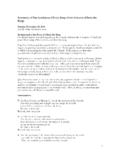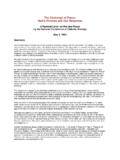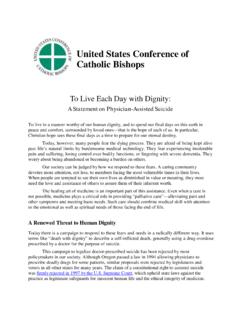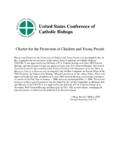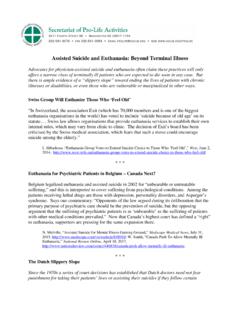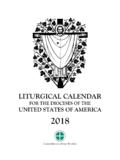Transcription of Catholic Social Teaching on Poverty, an Option for the ...
1 Catholic Social Teaching on Poverty, an Option for the Poor, and the Common Good The Catholic Church has a well-documented tradition on pursuit of the common good and care for the least of these (Mt. 25). This resource includes elements of Catholic Teaching that highlight this tradition. This resource is intended to serve as an introduction on this issue; it is not comprehensive. To read the complete text of a cited document, simply click on the title. Charity in Truth (Caritas in Veritate) Pope Benedict XVI, 2009 forming Consciences for faithful citizenship Catholic Bishops, 2007 The principle of subsidiarity reminds us that larger institutions in society should not overwhelm or interfere with smaller or local institutions, yet larger institutions have essential responsibilities when the more local institutions cannot adequately protect human dignity, meet human needs, and advance the common good (no.)
2 48). While the common good embraces all, those who are weak, vulnerable, and most in need deserve preferential concern. A basic moral test for our society is how we treat the most vulnerable in our midst (no. 50). The Compendium of the Social Doctrine of the Church Pontifical Council for Justice and Peace, 2005 Solidarity without subsidiarity, in fact, can easily degenerate into a Welfare State , while subsidiarity without solidarity runs the risk of encouraging forms of self-centred localism. In order to respect both of these fundamental principles, the State s intervention in the economic environment must be neither invasive nor absent, but commensurate with society s real needs (no. 351)..the universal destination of goods requires that the poor, the marginalized and in all cases those whose living conditions inter-fere with their proper growth should be the focus of particular concern.
3 To this end, the preferential Option for the poor should be reaffirmed in all its It affects the life of each Christian inasmuch as he or she seeks to imitate the life of Christ, but it applies equally to our Social responsibilities and hence to our manner of (no. 182). Department of Justice, Peace and Human Development 3211 4th St. NE Washington, DC 20017 (202)541-3160 If we love others with charity, then first of all we are just towards them. Not only is justice not extraneous to charity, not only is it not an alternative or parallel path to charity: justice is inseparable from charity, and intrinsic to it. Justice is the primary way of charity or, in Paul VI s words, the minimum measure of it, an integral part of the love in deed and in truth to which Saint John exhorts us (no.)
4 6). To desire the common good and strive towards it is a requirement of justice and The more we strive to secure a common good corresponding to the real needs of our neighbours, the more effectively we love them. Every Christian is called to practise this charity, in a manner corresponding to his vocation and according to the degree of influence he wields in the [state]. This is the institutional path--we might also call it the political path--of charity, no less excellent and effective than the kind of charity which encounters the neighbor (no. 7)..unemployment today provokes new forms of economic marginalization, and the current crisis can only make this situation worse. Being out of work or dependent on public or private assistance for a prolonged period under-mines the freedom and creativity of the person and his family and Social relationships, causing great psychological and spiritual the primary capital to be safeguarded and valued is man, the human person in his or her integrity: Man is the source, the focus and the aim of all economic and Social life (no.
5 25). No consideration of the problems associated with development could fail to highlight the direct link between poverty and unemployment. In many cases, poverty results from a violation of the dignity of human work, either because work opportunities are limited (through unemployment or underemployment), or because a low value is put on work and the rights that flow from it, especially the right to a just wage and to the personal security of the worker and his or her family (no. 63). Department of Justice, Peace and Human Development 3211 4th St. NE Washington, DC 20017 (202)541-3160 Economic Justice for All Catholic Bishops, 1986 Jesus takes the side of those most in need. As followers of Christ, we are challenged to make a fundamental Option for the poor --to speak for the voiceless, to defend the defenseless, to assess life styles, policies, and Social institutions in terms of their impact on the poor.
6 (no. 16)..poverty is not merely the lack of adequate financial resources. It entails a more profound kind of deprivation, a denial of full participation in the eco-nomic, Social , and political life of society and an inability to influence deci-sions that affect one s Therefore we should seek solutions that ena-ble the poor to help themselves through such means as employment (no. 188). The first line of attack against poverty must be to build and sustain a healthy economy that provides employment opportunities at just wages for all adults who are able to work. Poverty is intimately linked to the issue of Expanded employment especially in the private sector would promote human dignity, increase Social solidarity, and promote self-reliance of the poor (no. 196). A Place at the Table: A Catholic Recommitment to Overcome Poverty and to Respect the Dignity of All Gods Children Catholic Bishops, 2002.
7 The table we seek for all rests on these four institutions, or legs: (1) what families and individuals can do, (2) what community and religious institutions can do, (3) what the private sector can do, and (4) what the government can do to work together to overcome poverty (p. 14). The Catholic way is to recognize the essential role and the comple-mentary responsibilities of fami-lies, communities, the market, and government to work together to overcome poverty and advance human dignity (p. 18). Work must be an escape from poverty, not another version of it (p. 17). voluntary groups have irreplaceable roles, but cannot substitute for the proper working of the market and the just policies of the state (no. 7). Society has a moral obligation, in-cluding governmental action where necessary, to assure opportunity, meet basic human needs, and pur-sue justice in economic life (no.)
8 8). A fundamental moral measure of any economy is how the poor and vulnerable are faring (no. 3). In economic life, free markets have both clear advantages and limits; government has essential responsibilities and limitations; A Catholic Framework for Economic Life Catholic Bishops, 1996 Seven Themes of Catholic Social Teaching Catholic Bishops, 2005 Option for the Poor and Vulnerable A basic moral test is how our most vulnerable members are faring. In a society marred by deepening divisions between rich and poor, our tradition recalls the story of the Last Judgment (Mt 25:31-46) and instructs us to put the needs of the poor and vulnerable first. God is Love (Deus Caritas Est) Pope Benedict XVI, 2005 .. love for widows and or-phans, prisoners, and the sick and needy of every kind, is as essential to [the Church] as the ministry of the sacra-ments and preaching of the Gospel.
9 The Church cannot neglect the service of charity any more than she can ne-glect the Sacraments and the Word (no. 22). On the Hundredth Anniversary of Rerum Novarum (Centesimus Annus) Pope John Paul II ..what is being proposed as an alternative is not the Social -ist system, which in fact turns out to be State capitalism, but rather a society of free work, of enterprise and of participation. Such a society is not directed against the market, but de-mands that the market be ap-propriately controlled by the forces of society and by the State, so as to guarantee that the basic needs of the whole of society are satisfied. (no. 35)

